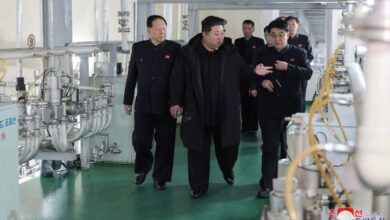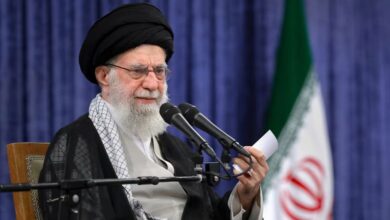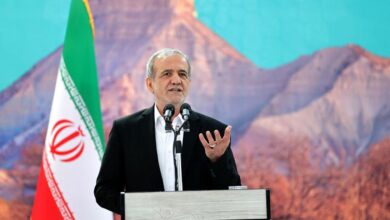TEHRAN — A protest and scuffles with police occurred in central Tehran on Wednesday in the first sign of public unrest over Iran's plunging currency, which this week has lost more than half of its value.
Hundreds of police in anti-riot gear stormed the capital's currency exchange district of Ferdowsi, arresting illegal money changers and ordering licensed bureaux and other shops closed, witnesses told AFP.
Several arrests were seen, carried out by uniformed police or plain-clothes security officers.
Smoke was seen in two places in the area.
Some appeared to come from a dumpster set on fire near the British embassy — evacuated last year after pro-government demonstrators stormed it.
The source of the other smoke could not be determined, with police directing pedestrians and vehicles away.
Individuals threw stones at police officers and a police car before running away, witnesses said.
A protest in Tehran's historic Grand Bazaar — a maze-like complex of shops vital to the city — also took place but was quickly put down by police.
"We closed because we don't know what is going to happen" in terms of the currency market, one shopkeeper said.
A police commander, Colonel Khalil Helali, was quoted by the Mehr news agency as saying police were going to take action against shopkeepers who closed their businesses, for "disturbing" the situation.
The head of the national police, Esmail Ahmadi Moghadam, was quoted by the Fars news agency as saying a special unit comprised of police chiefs and government economic officials had been created "to combat those perturbing the currency market."
He added that many people were keeping stashes of foreign currency and gold at home, "which is having a negative effect on the economy."
The crackdown was an apparent bid to halt a dramatic plunge in the value of Iran's currency this week.
On Tuesday, President Mahmoud Ahmadinejad said Western sanctions were mostly to blame. But rivals said his mismanagement of the economy was the main cause.
One money changer said almost no transactions were taking place in the market, making any valuation unreliable, but the assumption was the rial had stabilized early Wednesday at around 34,000 to the dollar.
Online websites that normally track the currency market were censored, none giving the rial's value against the dollar.
On Tuesday, the rial closed at around 36,100 to the dollar.
A week ago, it was trading at around 22,000 to the greenback and at 13,000 a year ago.
The money's plunge has greatly increased inflation in Iran, which is widely seen as far higher than the official 23.5 percent given by the central bank.
Food costs, notably, have spiraled, to the concern of Iranian families. Merchants, some of whom have lost millions of dollars in a day, say doing business has become nearly impossible.
The US government has said it sees the rial's plunge as proof Western sanctions are having a big impact on the Islamic republic's economy.
But Ahmadinejad said that, even with the "psychological war on the exchange market," Iran would not be pressured into curbing its nuclear activities — the stated aim of the sanctions.
"We are not a people to retreat on the nuclear issue," he told a news conference in Tehran.
"If somebody thinks they can pressure Iran, they are certainly wrong and they must correct their behavior," he said.
Iran, he said, had sufficient foreign currency reserves.
Those reserves were estimated at around $100 billion at the end of last year, thanks to surging oil exports.
But Iran's oil revenues have been decimated since, because of the sanctions. The US Treasury estimated Iran's foreign earnings have been cut by $5 billion per month




